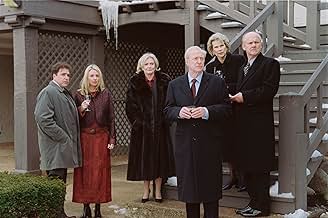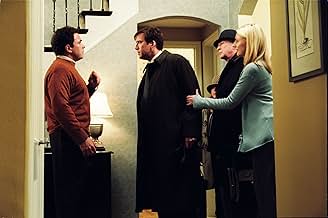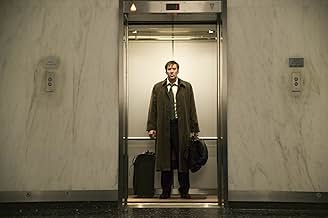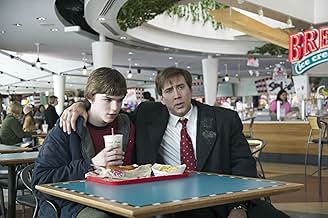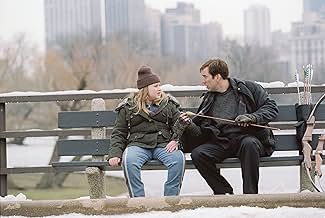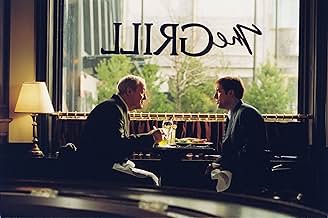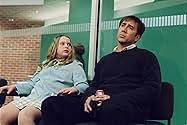Ein Wetterfrosch aus Chicago, getrennt von seiner Frau und seinen Kindern, debattiert darüber, ob sich beruflicher und persönlicher Erfolg gegenseitig ausschließen.Ein Wetterfrosch aus Chicago, getrennt von seiner Frau und seinen Kindern, debattiert darüber, ob sich beruflicher und persönlicher Erfolg gegenseitig ausschließen.Ein Wetterfrosch aus Chicago, getrennt von seiner Frau und seinen Kindern, debattiert darüber, ob sich beruflicher und persönlicher Erfolg gegenseitig ausschließen.
- Shelly
- (as Gemmenne De La Peña)
- Clerk
- (as Deanna NJ Brooks)
- Nurse
- (as Sia Moody)
- Fast Food Employee
- (as Alejandro Pina)
Empfohlene Bewertungen
So the story begins...Dave Spritz is a Chicago weatherman. As the events of his life get worse he begins to put all his faith in a dream job in New York as a national weatherman. He believes this job will magically restore his failing marriage, his relationship with this kids and garner him the respect from his father (Michael Caine)he so desires.
The ability to find humor in life's tragedies is an accomplishment that director, writer and cast can all be proud of. The comedy in this movie came just often enough to hold back the tears. It was a real life character study and of course Nicholas Cage and Michael Caine were absolutely superb.
What makes the movie so wonderful is that it is based on premises we all know but often forget. 1)Money doesn't buy happiness. 2)The little things mean a lot. 3)To quote the film, "The hard thing to do and the right thing to do are usually the same thing."
Nicolas Cage, who I don't always like, gives a fantastic performance as David Spritz, a Chicago TV weather man with no degree in meteorology. The thing that makes him great in The Weather Man is that he consistently plays the part in earnest. There's plenty of opportunities to ham it up or play it for laughs, especially because David acts like such an asshole so much of the time, but Cage never falls into those traps. One feels at every turn, no matter how disgraceful his behavior, that he's just a guy trying to do what seems right to him in that moment. At one point he drops his daughter off at his ex-wife's house. When his ex-wife, played with terrific subtly by Hope Davis, remains outside for a moment he suddenly decides to throw a snowball at her, which hits her in the face and cracks the lens of her glasses. Rather than playing it like it's funny, which it is, Cage seems like he's making a sincere attempt to connect with his former wife in any way he can.
I wish with great passion that this film was truly great, but unfortunately it's just inches short. Nine out of ten times Verbinski hits the mark. From the very first shot he creates a perfectly executed world of an ice bound Chicago during the winter months. His most impressive feat though is managing to craft a film that is in some ways highly stylized, yet instinctually feels like the human experience. He has a wonderful and surprising sense of composition. One finds the characters in disconcertingly angular frames with vast expanses of empty space above their heads. In tandem with this he uses a fantastically chilly color scheme throughout. He also triumphs in his insistently measured pacing. In contrast with such a harsh statement about life, the pacing serves to lend the film a strange gentleness that allows for us to feel the characters are truly human. The pacing is absolutely vital and absolutely brave in a Hollywood film. Along with the performances, it makes one feel that the characters are being not being tortured out of gleeful spite on the part of the filmmakers, but out of profound empathy and understanding of our shared human weaknesses.
Verbinski's trouble comes in just a few isolated areas; nevertheless they are important and significantly damage the film as a whole. The ugliest problem is a woefully ill-advised quasi dream sequence in which Nicholas Cage sees himself happy and well adjusted as the grand marshal of a parade. The whole thing is presented as if his hotel room window is like a TV on which he is seeing himself. It introduces us to no useful ideas and is an immensely distracting stylistic departure. I'm really puzzled by its inclusion in a movie that on the whole demonstrates a lot of restraint. Another issue is the handling of Cage's son, who gets himself involved in a weird molestation situation with his drug counselor. This subplot is painted in the broadest of strokes, rather than with the painstaking specificity one finds elsewhere. Every time we return to the plot with the son the film begins to feel bogged down and uncharacteristically unsure of itself. Some of the blame for this surely must be shared with Steve Conrad, the mostly solid writer of the film. One wonders why Conrad and Verbinski shy away from the unbending frankness they are generally so willing to dole out. There are a few other troubling mistakes, the blame for which I have to rest on both of their shoulders. Most notably the film relies too heavily on voice-over. While some of it works very well and all of it is delivered with sincerity from Cage, there is at least twice as much as is necessary. Similarly, there are a couple flashbacks that work, but just as many that are unneeded. Also, the handling of Cage's father, who is played with solemn dignity by Michael Cane, rings a little false. He is written as a noble and stalwart man devoid of any flaws not only in Cage's mind, but apparently in real life as well. On the whole this actually works much better than it should, but I can't help but feel that there's a note missing.
The aforementioned issues aside, The Weather Man is a rare achievement and one of my favorite films of the year. It is so honest and so bleak that I can't believe that a major studio let it get made. In an industry where schlock and melodrama are passed off as great statements about us as humans The Weather Man is monumentally refreshing. I have nothing but respect for Verbinski and Conrad for having the nerve to make a film that on the one hand is crushingly negative, but on the other endlessly humane.
Please do not let the trailer fool you. This is not slapstick comedy like "Anchorman". This is deep, often dark subject matter addressing the emotional struggles men face when dealing with a bad divorce, trying to maintain a relationship with kids, and the pressures of trying to make one's own dad proud (or at least gain acceptance). So often Hollywood deals with the plight of the woman and her emotional turmoil. Instead we are "treated" with watching a man's attempt to live up to (what he thinks are) expectations of others and how somehow the right job will make everything OK ... his life will be whole.
Nicolas Cage gives another outstanding performance as "The Weather Man" on a Chicago TV station. To add to the complexity, he is not a meteorologist and he is being courted by a national morning talk show featuring Bryant Gumbel. Two areas with this character are poorly written in my opinion. First, Cage's hair weave is bloody awful. At least in Dallas, weather men all look like Televangelists with perfect hair. His is always askew ... don't they have hair/make-up staff in Chicago? Second, the character is written as too much of a loser in all aspects. He is not just struggling, he is not someone any guy or girl would want to hang with. The film tries, but fails, to show the "switch" come on when Cage steps in front of the camera. They tell us this happens, but it needed to be presented much clearer.
Playing Cage's father, Michael Caine is a pretty intimidating figure as he is confused about his son's direction in life while at the same time facing a very dark future of his own. Caine is wonderful in the role and when he tells his son "Sometimes in life, you just have to chuck it", we really get it and hope that Cage does as well.
On the other hand, Hope Davis is cast as yet another frigid "B" yuppie whom I don't understand how any man could be attracted to. Yet somehow this is the woman Cage wants back. Time to stretch your talent a bit Hope. You showed plenty of promise in "About Schmidt" and have been working steadily since. But to take the next step as an actress, you need to try a new character. Gil Bellows ("Aly McBeal") has a creepy role as Cage's teenage son's counselor. He is responsible for some of the most uncomfortable moments as well as a way for Cage to finally cut loose.
As I said, this is a very good movie that falls just short of greatness. While providing insight into the male psyche, it fails to deliver the message or solution it seemed to be leading up to. However, it is nice to see a man portrayed as something other than a superhero, adulterer, international spy or Olympic caliber lover.
David Spritz is a man whose life has become the ultimate exercise in futility. Each day, he wakes up and goes to a job that, despite paying a handsome salary, is entirely unfulfilling. His relationship with his ex-wife is strained, his relationship with his children distant. To make things worse, his Pulitzer Prize winning father seems to be disappointed in what David has done with his life.
In real life, progress in one's personal life is generally made in baby steps. Usually, people don't undergo a drastic transformation over the course of several months. David attempts to improve his standing in life, at times failing entirely, at times succeeding in small doses. The results of these attempts range from very funny to downright saddening, and this helps lend the film an air of realism. This is a complicated character study about a man coming to grips with the fact that he's failed to meet any of the goals he set for himself in life, despite attaining a social standing that many people are envious of. There aren't any easy answers or life altering epiphanies; self-improvement is a long, gradual task that will probably never be completely fulfilled, and "The Weather Man" reflects this reality. While not for all tastes, this movie deserves credit for tackling a relatively conventional subject in a very unconventional, at least for a mainstream Hollywood movie, manner. I imagine that this film will be a bigger success overseas and on DVD than it will be in its US theatrical run.
David Spritz (Nicholas Cage) is a TV pawn the station uses as a weatherman: he is untrained as a meteorologist, skilled only be his TV persona success dependent on a created gag/tag line - the Nipper (the peak worst day in the forecast). His personal life is a mess, separated from a disconsolate wife Noreen (Hope Davis), distanced from his successful writer father Robert (Michael Caine) and on shaky territory with his two children - fat and sad Sully (Gemmenne de la Peña) and sweet but troubled pothead Mike (Nicholas Hoult). To make life worse his TV persona follows him into the streets of blustery Chicago where his viewers either seek autographs invading his privacy or throw food at him as the progenitor of the lousy cold weather. This polarized existence is invaded by an offer to become weatherman on Bryan Gumbel's Hello America show in New York (a career jump for which he longs for many reasons), serial confrontations with his father whom he emulates but always feels a failure, the finding that his father has lymphoma, the ridicule of fat Shelly at school, Mike's edgy involvement with his drug counselor Don (Gil Bellows), and Noreen's new live-in Russ (Michael Rispoli). How David meanders through this quagmire of dilemmas is the story and while it is not pretty, it is pungent.
Cage inhabits the strange role of David finding a way to make this loser with a short temper someone about whom we care. It is a tough assignment but Cage meets it on every level. Michael Caine provides some of the more eloquent moments in the film: his words of wisdom and view of life are the only grounded elements of the story. Likewise Hope Davis is fine as are the cameo roles of the children as sensitively played by de la Peña and Hoult. The subject of the film is tough and the excessive use of potty mouth language is overbearing and at times one wishes Verbinski would have edited some of the gross food slinging scenes.
But as an overall message movie there is much here to admire. It simply is not the mindless slapstick the posters and trailers would indicate. The PR folks on this one blew it. Worth your time and attention. Grady Harp
Wusstest du schon
- WissenswertesThe "plastic" spoon stuck to Nicolas Cage's lapel was actually a metal spoon that had been painted to appear plastic and which was held in place with a magnet.
- PatzerWhen David enters the bathroom and rinses, the mirror reveals that his watch is undone and hanging around his wrist. In the next shot, from a different angle, his watch is done up.
- Zitate
Dave Spritz: I remember once imagining what my life would be like, what I'd be like. I pictured having all these qualities, strong positive qualities that people could pick up on from across the room. But as time passed, few ever became any qualities that I actually had. And all the possibilities I faced and the sorts of people I could be, all of them got reduced every year to fewer and fewer. Until finally they got reduced to one, to who I am. And that's who I am, the weather man.
- VerbindungenFeatured in Atmospheric Pressure: The Style and Palette (2006)
- SoundtracksThe Passenger
(1977)
Written by Iggy Pop & Ricky Gardiner
Performed by Iggy Pop
Courtesy of Virgin Records
Under license from EMI Film & Television Music
Top-Auswahl
- How long is The Weather Man?Powered by Alexa
Details
- Erscheinungsdatum
- Herkunftsländer
- Sprache
- Auch bekannt als
- El sol de cada mañana
- Drehorte
- Produktionsfirmen
- Weitere beteiligte Unternehmen bei IMDbPro anzeigen
Box Office
- Budget
- 22.000.000 $ (geschätzt)
- Bruttoertrag in den USA und Kanada
- 12.482.775 $
- Eröffnungswochenende in den USA und in Kanada
- 4.248.465 $
- 30. Okt. 2005
- Weltweiter Bruttoertrag
- 19.126.398 $
- Laufzeit1 Stunde 42 Minuten
- Farbe
- Sound-Mix
- Seitenverhältnis
- 1.85 : 1
Zu dieser Seite beitragen





